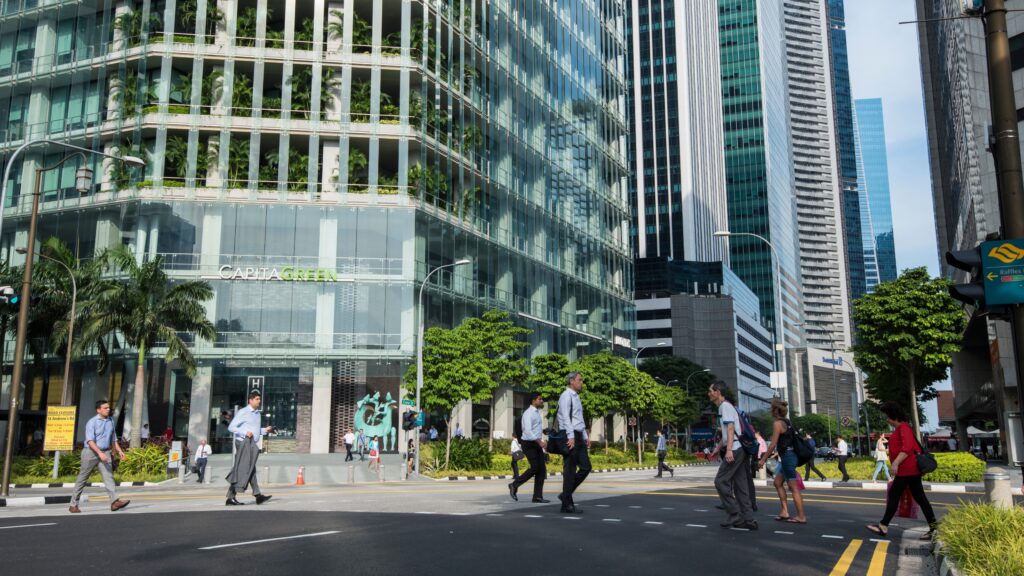
Image: Shadow of light / Shutterstock.com
SINGAPORE, July 30, 2024 – Growth is expected to strengthen in 2024 to 2.2 percent driven by a turnaround in exports and resilient domestic demand. With inflation moderating but risks for higher inflation persisting, maintaining the tight monetary policy stance is critical to anchor inflation expectations while providing targeted fiscal support to alleviate the rising cost of living.
This preliminary assessment was made by the ASEAN+3 Macroeconomic Research Office (AMRO) after its Annual Consultation Visit to Singapore from June 24 to July 18, 2024.
The mission was led by AMRO Lead Economist, Kevin Cheng. AMRO Director, Kouqing Li and Chief Economist, Hoe Ee Khor participated in the policy discussions. The discussions focused on Singapore’s recent macroeconomic developments, risks and vulnerabilities, and policy recommendations to support growth and stability in an environment of elevated inflation, rising interest rates, and subdued global demand.
Economic developments and outlook
“Singapore’s economy grew at a slower pace of 1.1 percent in 2023 due mainly to weak external demand,” said Dr. Cheng. “However, growth is expected to strengthen in 2024 to 2.2 percent driven by a turnaround in exports and resilient domestic demand.”
The manufacturing sector, particularly electronic products, continued to weaken in 2023 as external demand weakened. The service sector also slowed amid fading tailwinds from domestic revenge spending and tourist activity. However, the construction sector picked up as the return of foreign labor following the reopening eased the supply constraint.
Inflation has sustained its downward trend, slowing from a peak of 7.5 percent in September 2022 to 2.4 percent in mid-2024. The continued moderation is attributable to the decline in Certificate of Entitlement (COE) prices and car ownership cost. For 2024, average headline inflation is forecast to be 2.8 percent.
Non-oil domestic exports fell sharply in 2023 by 13.1 percent due to weak semiconductor demand and lower commodity prices. However, signs of recovery emerged in early 2024, led by electronics exports. The external position remains resilient with higher FDI and international reserves.
Elevated, albeit moderating, inflation amid firm domestic demand prompted the Monetary Authority of Singapore (MAS) to maintain the current tight monetary policy stance. The rate of appreciation and policy band of the Singapore Dollar Nominal Effective Exchange Rate (NEER) was kept unchanged since its last upward adjustment in October 2022. Gradual appreciation of NEER and subdued price pressures from food and energy are expected to support the moderation of inflation with current policy.
The FY2023 fiscal position shifted into a deficit, reversing the small surplus in FY2022, mainly due to additional transfers to households. Operating revenue is projected to remain stable in FY2024. The overall fiscal position is projected to shift to a slight surplus of 0.1 percent of GDP on account of lower top-ups to endowment and trust funds.
Risks, vulnerabilities, and challenges
General macrofinancial stability risks to the overall economy receded in 2024 compared with the previous year, albeit with some remaining pockets of risks and vulnerabilities. A spike in commodity prices or tighter labor market conditions could lead to a resurgence of inflation. Global energy prices could surge due to intensifying geopolitical tensions and production cuts by major energy producers.
Slower growth in major trading partners could dampen exports recovery. Growth slowdown in China—Singapore’s largest trading partner—due to protracted weakness in its property sector could weigh on investments, and consumption demand. The United States could experience sharper growth moderation and new financial vulnerabilities. Adverse spillovers from the US presidential election could disrupt trade and investment flows. In the long term, Singapore’s fiscal spending will be significantly strained by higher costs of healthcare and social protection amid an aging population, and increased expenditure to safeguard climate resilience.
Policy recommendations
The current tight monetary stance of MAS to anchor inflation expectations is appropriate while preparing to finetune if downside risks materialize. On the other hand, weaker-than-expected economic activities could justify monetary policy easing.
The neutral fiscal stance is appropriate given the still high inflation and a near-zero output gap, and the continued focus on Singapore’s longer-term priorities is commendable. AMRO supports the continued near-term focus in supporting lower-income households and businesses through targeted and calibrated policies to help households and small businesses cope with higher costs are welcomed.
AMRO supports the authorities’ key priorities in fostering a more productivity-driven economy and equitable society through growth-enhancing fiscal spending. Notwithstanding longer-term labor productivity challenges, AMRO welcomes the progress in enhancing labor market resilience. The authorities should continue to emphasize on green transition and strive to strengthen Singapore’s competitiveness.
The AMRO team would like to express its gratitude to the Singaporean authorities and other participating organizations for their cooperation and candid exchange of views. AMRO wishes to express its appreciation for the strong support from the authorities and the excellent arrangement that has made this mission possible.
About AMRO
The ASEAN+3 Macroeconomic Research Office (AMRO) is an international organization established to contribute toward securing macroeconomic and financial resilience and stability of the ASEAN+3 region, comprising 10 members of the Association of Southeast Asian Nations (ASEAN) and China; Hong Kong, China; Japan; and Korea. AMRO’s mandate is to conduct macroeconomic surveillance, support regional financial arrangements, and provide technical assistance to the members. In addition, AMRO also serves as a regional knowledge hub and provides support to ASEAN+3 financial cooperation.
